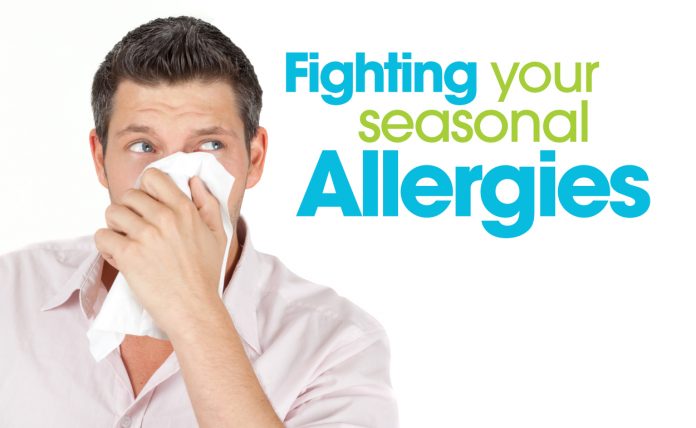Springtime means budding trees and plants, but for the millions who suffer from allergies, it can also mean sneezing, wheezing, and itchy, watery eyes.
Seasonal allergic rhinitis, which many people call “hay fever,” affects nearly 20 percent of Americans and is caused by outdoor allergens that typically trigger symptoms in the spring and fall. Airborne pollens and mold spores can cause symptoms such as sneezing, congestion, a runny nose, and itchiness in the nose, roof of the mouth, throat, eyes and ears.
If you’re among the millions of people who suffer from seasonal allergies, the good news is that you can find relief from your symptoms:
Know the symptoms. The first step toward fighting allergies is to know whether you have them or not. Signs can be very similar to having sinusitis or suffering from something else, like a head cold. Watch for signs like a runny, stuffy or itchy nose, sneezing, itchy or watery eyes, or dark circles under your eyes, pressure in your cheeks and ears, and hives or rash.
Choose your outdoor time wisely. Minimize early morning outdoor activity when pollen is usually emitted, between 5 a.m. and 10 a.m. Pay attention to pollen and mold counts, and stay indoors when the count or humidity is high and on windy days when dust and pollen are more likely to be in the air. Consider taking a vacation during the height of pollen season to a more pollen-free area, such as the beach.
Steer clear from allergy-triggering activities. For those with allergies, springtime offers the perfect excuse to skip out on chores. Avoid lawn work or mowing lawns, which stir up pollens and molds that trigger symptoms. You may also want to consider removing your houseplants and using fans to keep dry air moving through your home.
Find the right medicine. Medications can help lessen your symptoms, too. If your symptoms are mild, an over-the-counter remedy may help. Antihistamines treat sneezing, runny noses and itching, while decongestants relieve stuffy noses. Both are available without a doctor’s prescription. If your symptoms are severe, your doctor may suggest you have a simple allergy test to find out exactly what’s causing them. Your doctor may prescribe eye drops or nasal spray to beat severe symptoms.
Fido-proof your home. Perennial allergies are triggered by indoor allergens and may make seasonal allergy symptoms even worse. Dust mites and family pets are two major causes that can exacerbate allergy symptoms. Your pets might make your allergies worse, especially if they go outside. Dust regularly and try to keep your pets clean and out of your bedroom.
 BY: Joel Hoffman, MD
BY: Joel Hoffman, MD
Board Certified, ENT & Sleep Medicine
North Atlanta Ear Nose and Throat Associates
Dr. Joel Hoffman is Board Certified in Otolaryngology and Sleep Medicine. He practices at North Atlanta Ear, Nose and Throat Associates in Cumming. He can be reached at (770)292-3045, or visit www.naenta.com for more information.

















